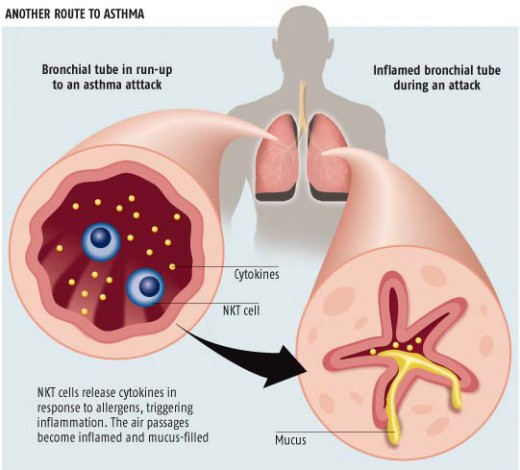Autumn is the season when asthma symptoms reach almost epidemic proportions. Doctor’s offices and emergency rooms fill with children and adults coughing, wheezing having shortness of breath and respiratory distress. Hospital admissions for asthma increase from October through December. It’s a good time to review asthma, its causes, prevention, and treatment.
WHAT IS ASTHMA
Asthma is not a disease rather it is a syndrome. It is defined by the symptoms produced, wheezing cough, shortness of breath, mucous production and respiratory distress. The immediate symptoms are caused by bronchial muscle spasm, the later symptoms, are from mucosal inflammation. These symptoms are associated with allergy, smoking, infection, various lung diseases and infant prematurity.
Allergy asthma is seen mostly in children and young adults. Wheezing is seen in infancy usually provoked by viral respiratory illness. When the child has no allergy the likelihood is that he will “outgrow” his wheezing. Respiratory Syncytial Virus (RSV) is particularly virulent causing brochiolitis and pneumonia in infants. Asthma may last into adolescence. If allergy is present with wheezing, symptoms may continue into adulthood. Allergens that are closely associated with asthma are dust mite, cockroach, cat, dog, tree pollen and ragweed pollen. Mold, such as alternaria (outdoor mold) has been reported to cause outbreaks of asthma in the Midwest. In children wheezing may be signs of Cystic Fibrosis or lung damage from premature birth.
Adult asthma is a mixed bag of diseases. Allergy asthma is still seen, however is it mixed in with bronchitis from smoking or occupational exposures, lung diseases such as sarcodoisis, or pneumonia. Asthma symptom may occur from bacterial as well as viral infections.
Chronic obstructive lung disease (COPD) may overlap with asthma symptoms. Generally speaking COPD symptoms are not reversible because lung damage is permanent.
Asthma may be brought on by exercise such as running or swimming. Cold air in the winter months irritates the lung, causing wheezing. Sometimes a chronic cough masquerades as asthma, especially in children. These symptoms are provoked by bronchial muscle spasm.
DIAGNOSTIC TESTS
The proper diagnosis of asthma requires a comprehensive history including work exposures, chest x-ray, breathing tests (spirometry) and allergy testing. Occasionally inhalation challenge or exercise challenge to induced bronchospasm is required especially if cough is the only symptom. The patient may have to be followed over time to see if wheezing is related to the weather, season or any specific situation.
TREATMENT
Once the diagnosis of asthma is made, treatment will depend upon elimination of triggers, and medications to control symptoms. There is no cure, however symptoms can be greatly reduced and normal activities, including sports can continue.
When allergy is present, environmental control at home to dust mite, cockroach and pets is helpful. Spring and fall allergies may require allergy immunotherapy. Xolair a new biologic treatment option is available for severe asthmatics.
Medications fall into 2 groups, rescue and controllers. Brochodilators are inhaled rescue medications and are used pre-exercise or for sudden attacks of wheezing or respiratory distress. Treatment is given every 4-6 hrs. Corticosteroid inhalers are used for inflammation on a regular basis 1-2 times a day chronic congestion, cough and/or respiratory distress. Often both medications are used together. Persistent asthma may require a fixed combination of corticostereoid and long acting bronchodilators. Oral controller medications exist for exercise-induced, cough variant, and mild persistent asthma.
An allergist or other asthma specialists are able to identify, diagnose and treat the various forms or asthma and offer the patient a normal lifestyle. The goal of treatment is to allow the patient to have a full life.
Dr. Gontzes, is board certified in Allergy & Immunology and has 31 years of experience. He is a resident of Middle Village and a member of the Juniper Park Civic Association.
Peter Gontzes MD
9231 57th Ave
Elmhurst, NY 11373
(718) 592-1731



